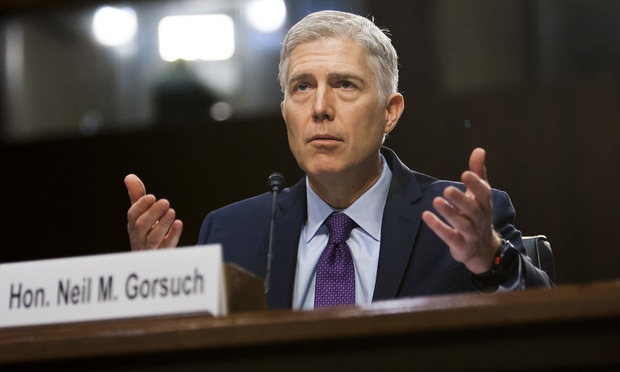 Neil Gorsuch testifies at his confirmation hearing in 2017. Credit: Diego M. Radzinschi/ ALM
Neil Gorsuch testifies at his confirmation hearing in 2017. Credit: Diego M. Radzinschi/ ALM
The U.S. Supreme Court’s junior justice—Neil Gorsuch—is sampling Capitol Hill’s social scene.
Following the end to the federal government shutdown, Senate Majority Whip John Cornyn, R-Texas, hosted a dinner party in his home with Gorsuch, Sen. Lamar Alexander, R-Tennessee, Trump administration Transportation Secretary Elaine Chao and other unnamed senators.
Alexander tweeted about the dinner Monday night: “I enjoyed having dinner tonight at the home of Senator John Cornyn and his wife Sandy with our newest Supreme Court Justice, Neil Gorsuch, Transportation Secretary Chao and a few of my other Senate colleagues to talk about important issues facing our country.”
Alexander on Tuesday expanded on his tweet in a statement saying: “Last night’s dinner was purely social. We weren’t discussing political activities and we certainly know better than to discuss any issues before the court.”
Gorsuch, who filled the vacancy created by the 2016 death of Justice Antonin Scalia, attracted criticism and some protests for his speech in September to the conservative Fund for American Studies at the Trump International Hotel in Washington and an appearance in Kentucky in September with Republican Senate Majority Leader Mitch McConnell.
Leonard Leo, executive vice president of the Federalist Society, who advised President Donald Trump on Supreme Court and other judicial nominees, wrote of Gorsuch in this Newsweek op-ed: “He will likely serve for decades, and may well be the deciding vote in enormously important cases touching on free speech, religious liberty, gun rights and the scope of authority of the administrative state.” Gorsuch was the keynote speaker in November at the Federalist Society’s annual meeting.
Alexander’s tweet generated buzz about the ethics of Gorsuch dining with a political group. Ed Whelan, president of the conservative think tank Ethics and Public Policy Center, said there is no ethical violation.
“Surely happens all the time (with key variable being how sociable a justice is—Souter probably didn’t do this),” Whelan tweeted in response to a question. “Justices don’t take vows to be hermits. Nothing here remotely suggests ethical issue.”
Cornyn, in response to questions by publication The Hill, reportedly said:
“It was a private dinner, but I think about it as a return to civility in Washington, something we could use more of.“
Gorsuch’s appearance at the dinner did not sit well with everyone, and some tweets about the dinner reflected skepticism and cynicism. One said: “If it was a return to civility, then which Dems were invited?” Another said: “Oh yeah sure. Right. Nothing to see here.”
Nancy Leong of the University of Denver Sturm College of Law questioned in a tweet: “I am sure GOP twitter would be very chill if Justice Sonia Sotomayor was having dinner at the home of Senator Kamala Harris to ‘talk about important issues facing the country.’” (Harris is a California Democrat, and a new member of the Senate Judiciary Committee.)
Of course, the justices’ dinner plans and social circles are generally private, and as Whelan suggested, some of them do mix with politicos and others in business and industry.
The late Justice Scalia famously went duck hunting with then-Vice President Dick Cheney, and at the time he died at a Texas ranch in 2016, he was with members of an elite fraternity of hunters called the International Order of St. Hubertus. The order’s members included Scalia friend and Washington lawyer C. Allen Foster, senior counsel at Whiteford Taylor Preston.
Justice Sonia Sotomayor in 2015 reportedly dined with George and Amal Clooney at the New York restaurant Cipriani. Amal Clooney, a human rights lawyer, clerked for Sotomayor during her stint on the U.S. Court of Appeals for the Second Circuit.
Throughout history, there have been social and friend relationships between justices and politicians. One of the most famous friendships between presidents and justices was that of Franklin Roosevelt and Felix Frankfurter.
Instead of taking aim at Gorsuch, John Q. Barrett of St. John’s University School of Law on Tuesday criticized Alexander for his tweet.
“For the idea of judicial independence, this is an unfortunate post,” Barrett wrote. “I presume that #SCOTUS Justice Gorsuch, who is allowed to eat and even to socialize with elected officials, was not plotting #GOP politics. @SenAlexander should have been more careful not to suggest otherwise.”
Read more:
Justice Ginsburg Scorns ‘History Lesson’ in This Gorsuch Dissent
Gorsuch Dishes on Civility, Firing Clients, Discovery Karma, and Hot Tubs With Law Clerks
‘You’re a Bunch of Radicals,’ Gorsuch Jokes at Federalist Society Dinner
Trump’s Supreme Court Wish List Grows By Five Judges
Gorsuch’s Gitmo Apology, Memorable Footnotes and Clerk Diversity: SCOTUS Headlines


